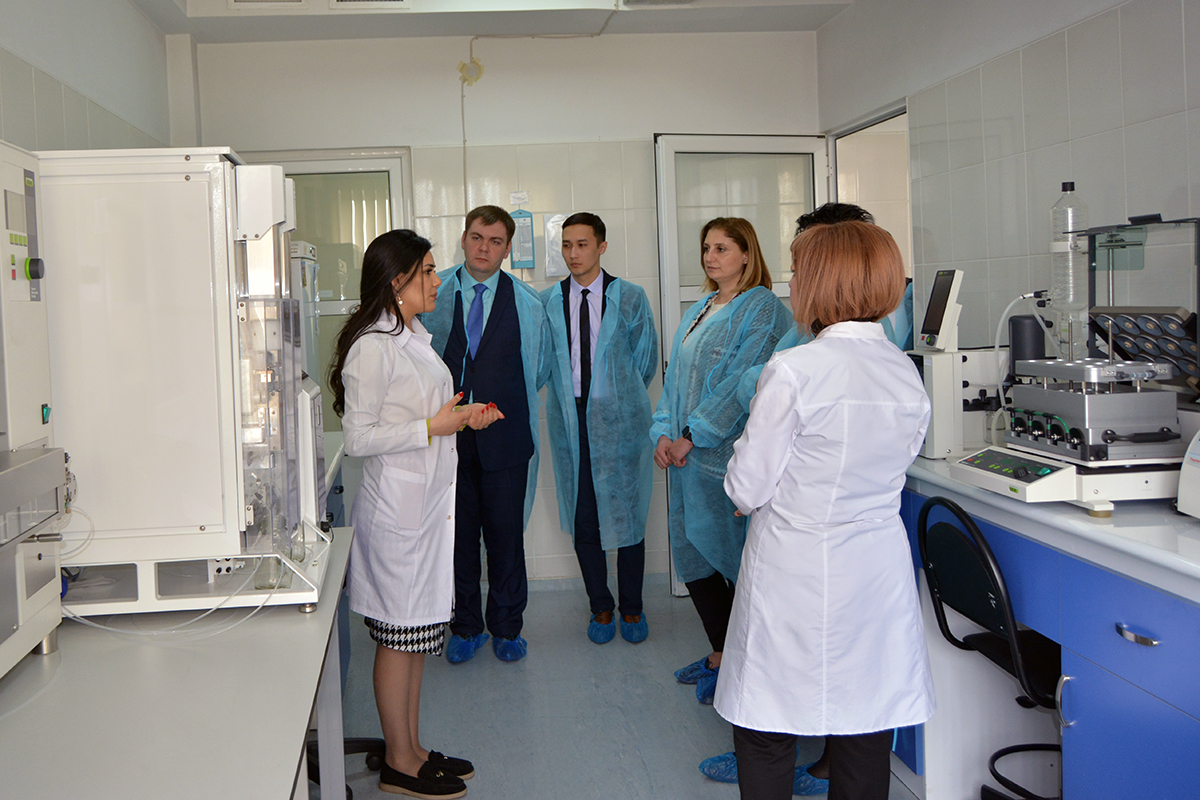Coordinator for Europe in Armenia and Moldova to promote participation in Codex
A delegation led by the Codex Alimentarius Regional Coordinator for Europe, Nailya Karsybekova, visited the Republic of Armenia from 29 to 30 April and the Republic of Moldova on May 2 and 3, to enhance participation of these countries in Codex. During the mission, meetings were held at the Ministries of Agriculture, Ministries of Health, the Inspection Bodies for Food Safety, and at the FAO and WHO Country Offices.
"The visits to Armenia and Moldova provided an opportunity to meet top-level representatives and decision-makers within the food chain and to re-confirm the importance of Codex Standards in ensuring consumer health and fair practices in food trade", said Karsybekova.
Deputy Minister of Agriculture of the Republic of Armenia Artak Kamalyan, opened a round table meeting held at the Ministry of Agriculture with the participation of representatives of different stakeholders, including state structures, the Armenian National Agrarian University, the FAO country office and non-governmental organizations in the field of consumer rights protection.

Well-equipped, labs benefit the food control system in Armenia
Key food safety challenges in Armenia include identifying and mitigating potential risks relating to pesticide and veterinary drug residues, chemical hazards that threaten food, antibiotic resistance and the need for food safety risks assessments. “These challenges put great responsibility on Government to develop policies and regulatory frameworks that establish and implement effective food safety systems”, said Iren Melkonyan, Codex Contact Point in Armenia. “Such meetings and discussions help to strengthen the role of Codex in a country and region in whole and to enhance a country’s participation in Codex activities”, she said.
In both countries, the Codex team presented the organizational structure of Codex Alimentarius, the role of CCEURO in coordinating regional Codex activities, the strategy for developing basic Codex documents within the relevant committees and the role of Codex in agricultural exports. The Armenian and Moldova hosts explained food safety policy in their countries, the structure of food safety control, as well as the scientific basis for risk assessment. Discussions explored the scope of activity of the National Codex Committee and the prospects for enhancing the capacity of Codex.
Read more
CCEURO regional web page
Learn more about FAO in Armenia
At the heart of the Codex mandate are the core values of collaboration, inclusiveness, consensus building and transparency. Governmental and non-governmental, public and private organizations alike play a vital role in ensuring Codex texts are of the highest quality and based on sound science.
Codex would have little authority in the field of international standard setting if it did not welcome and acknowledge the valuable contributions made by observers. Expert technical bodies, industry and consumer associations
contribute to the standard-setting process in a spirit of openness, collaboration and transparency.
Intergovernmental organizations (IGOs) and international non-governmental organizations (NGOs) can apply for observer status in Codex in order to attend and put forward their views at every stage of the standard-setting process.
 Current Codex Alimentarius Commission
Current Codex Alimentarius Commission
Coordinator for Europe in Armenia and Moldova to promote participation in Codex
A delegation led by the Codex Alimentarius Regional Coordinator for Europe, Nailya Karsybekova, visited the Republic of Armenia from 29 to 30 April and the Republic of Moldova on May 2 and 3, to enhance participation of these countries in Codex. During the mission, meetings were held at the Ministries of Agriculture, Ministries of Health, the Inspection Bodies for Food Safety, and at the FAO and WHO Country Offices.
"The visits to Armenia and Moldova provided an opportunity to meet top-level representatives and decision-makers within the food chain and to re-confirm the importance of Codex Standards in ensuring consumer health and fair practices in food trade", said Karsybekova.
Deputy Minister of Agriculture of the Republic of Armenia Artak Kamalyan, opened a round table meeting held at the Ministry of Agriculture with the participation of representatives of different stakeholders, including state structures, the Armenian National Agrarian University, the FAO country office and non-governmental organizations in the field of consumer rights protection.

Well-equipped, labs benefit the food control system in Armenia
Key food safety challenges in Armenia include identifying and mitigating potential risks relating to pesticide and veterinary drug residues, chemical hazards that threaten food, antibiotic resistance and the need for food safety risks assessments. “These challenges put great responsibility on Government to develop policies and regulatory frameworks that establish and implement effective food safety systems”, said Iren Melkonyan, Codex Contact Point in Armenia. “Such meetings and discussions help to strengthen the role of Codex in a country and region in whole and to enhance a country’s participation in Codex activities”, she said.
In both countries, the Codex team presented the organizational structure of Codex Alimentarius, the role of CCEURO in coordinating regional Codex activities, the strategy for developing basic Codex documents within the relevant committees and the role of Codex in agricultural exports. The Armenian and Moldova hosts explained food safety policy in their countries, the structure of food safety control, as well as the scientific basis for risk assessment. Discussions explored the scope of activity of the National Codex Committee and the prospects for enhancing the capacity of Codex.
Read more
CCEURO regional web page
Learn more about FAO in Armenia
 Codex and Observer
Codex and Observer
around the world since ancient times.
We might not always know where it comes from,
but we expect it to be available, safe and of good quality.









Leave a comment